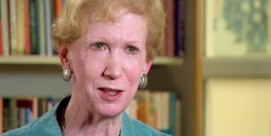In This Episode << SLIDE LEFT TO SEE ADDITIONAL SEGMENTS
Religion, Family, and the General Social Survey
Analysis: Religion, Family, and the General Social Survey
W. Bradford Wilcox
I have conducted new analyses of the General Social Survey (GSS), a nationally representative survey sponsored by National Opinion Research Center at the University of Chicago. Basically, I find very strong associations between religion and marriage in the U.S., ties that are particularly strong for men and weaker for African Americans. For the most part, I rely on GSS data from 1992 to 2002:
Tables & Figure (PDF, 208 KB)
-
Family Structure and Religious Change. Weekly religious attendance in the U.S. fell from 41 percent in 1972 to 31 percent in 2002. My statistical analyses of the data indicate that 28 percent of the decline in religious attendance over the last 30 years can be attributed to family change, especially the fact that fewer adults are now married with children (see below). In a word, changes in family structure have played an important role in the nation’s secularization.
-
Family Structure and Current Religious Attendance. Table 1 indicates that being married and having children are both associated with higher levels of religious attendance. Specifically, adults who are married with children are significantly more likely to attend religious services weekly, compared to adults who are single and/or childless. This is true for the entire U.S. population, and it is also true for whites, blacks, and Latinos. For instance, 32% of men and 39% of women who are married with children attend weekly, compared to 15% of men and 23% of women who are single without children. Figure 1, which reports data from new parents in a sample of 20 cities in the U.S., indicates similar trends apply to blacks, Latinos, and white parents in urban America.
-
Religion, Family, and Men. Marriage matters more for men than it does for women in predicting religious attendance. Men are a lot less likely to attend church if they are not married with children, compared to women. Table 1 indicates that men are 57% less likely to attend church weekly if they are single with no children, compared to men who are married with children. Women are only 41% less likely to attend church weekly if they are single and childless. Similar trends are found among blacks and whites, but less so among Latinos.
-
Race, Gender, and Churchgoing. The gender gap between married white and black parents is the same–only 7 percentage points. But the gender gap between unmarried white and black parents is quite different–only 8 percentage points for whites and 23 percentage points for blacks. Given family trends among African Americans (i.e., the high percentage of unmarried parents among blacks), this means that Black churches have many more mothers than fathers sitting in the pews on any given Sunday. The mother-father gap is less salient in predominantly white churches.
-
Divorce and Religion. Divorce is most common among Black Protestants, unaffiliated Americans, and evangelical Protestants. But once we look at attendance, we see that most religious Americans who attend weekly are significantly less likely to have been divorced (except Black Protestants). Active Catholics are least likely to report a divorce or separation–only 27% report a marital dissolution. Overall, 32% percent of weekly attendees have been divorced/separated, compared to 47% of adults who attend less frequently or not at all.
-
Religion, Gender, and Marital Happiness. When it comes to marital happiness, evangelical men and women, mainline Protestant men, and Jewish women are the most likely to report that they are very happy in their marriages. Table 3 indicates that this is especially true for evangelical and mainline Protestants who attend weekly. Black Protestant married men and especially women are much less likely to benefit from weekly attendance when it comes to marital happiness. More generally, 72% of married men who attend weekly report that they are very happy in their marriages, compared to 60% of married men who don’t attend weekly. Likewise, 64% of married women who attend weekly report that they are very happy in their marriages, compared to 58% of married women who don’t attend weekly. This means that church attendance seems to matter more for men than women in predicting marital happiness.
-
Religion, Marriage, and Overall Happiness. Table 4 indicates that weekly religious attendance and marriage are both associated with higher reports of happiness among U.S. adults. In fact, more than 48 percent of adults who are married and weekly churchgoers report that they are very happy, compared to just 20 percent of adults who are unmarried and do not attend church weekly. Adults who are married but not regular churchgoers and adults who are regular churchgoers but are not married fall in between these two groups in their reported levels of happiness. Gender differences in overall happiness are not very large.







